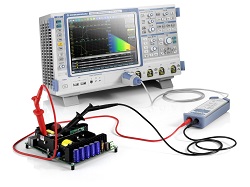The new R&S RT-ZHD high voltage differential probes are designed for complex measurements on state-of-the-art power electronics with voltages up to 6000 V. They offer a measurement bandwidth of up to 200 MHz, a particularly high common mode rejection ratio (CMRR) and at 0.5 percent, the best DC measurement accuracy available. Rohde & Schwarz also presents cost-efficient, high voltage differential probes with a 25 MHz bandwidth and very low inherent noise – ideal for general applications.
Demand in the automotive industry for compact, highly efficient switched-mode power supplies, inverters and electric drives necessitates the use of leading-edge semiconductor components. This creates new challenges for T&M equipment. The new high voltage differential probes from Rohde & Schwarz enable measurements with outstanding signal integrity and are perfect for use with the new R&S RTM3000 and R&S RTA4000embedded oscilloscopes.
200 MHz measurement bandwidth and excellent common mode rejection
The new R&S RT-ZHD high voltage differential probes are ideal for measurements on modern power semiconductors. With a bandwidth of up to 200 MHz, they can even measure very fast switching edges. The excellent common mode rejection across the entire frequency range effectively suppresses fast-switching common mode signals. There are four different models with maximum peak voltages from 750 V to 6000 V.
Up to 2000 V offset compensation
The integrated offset compensation operates independently of probe attenuation and the oscilloscope’s vertical settings. This makes it possible to measure even very small ripple voltages with a large DC component. Thanks to an offset compensation of up to 2000 V, the R&S RT-ZHD probes cover a very large range of measurement applications.
Highest DC measuring accuracy
At ± 0.5 percent, the R&S RT-ZHD high-voltage differential probes have the best DC measuring accuracy on the market. The probes also feature an integrated R&S ProbeMeter that measures DC offset with ± 0.1 percent accuracy. The readings are displayed directly on the oscilloscope.
Full integration eliminates errors
Complete integration of the R&S RT-ZHD probes into the user interface of Rohde & Schwarz oscilloscopes eliminates erroneous readings. The oscilloscopes automatically recognize the configured attenuation factor as well as all other probe settings, so they always display the correct voltages and reliably detect incidents such as overvoltage. Probe functions can also be accessed via the SCPI remote control interface, making the probes a good choice for automated tests. The R&S RT-ZHD probes are compatible with both the new R&S RTM3000 and R&S RTA4000 embedded oscilloscopes as well as the Windows-based R&S RTE1000 and R&S RTO2000 oscilloscopes.
R&S RT-ZD002/-ZD003: when 25 MHz bandwidth is sufficient
Two other new additions are the R&S RT-ZD002 and R&S RT-ZD003 differential probes with maximum input voltages up to 700 V and 1400 V, respectively. These 25 MHz probes boast very low inherent noise for their class of around 7 mV (RMS) and 14 mV (RMS), respectively. Their BNC interface makes them a perfect fit for R&S RTC1000, R&S RTB2000 and all standard oscilloscopes.
High-performance portfolio for power electronics measurements
These new probes enhance the Rohde & Schwarz portfolio for power electronics measurements. The new R&S RT-ZHDand R&S RT-ZD002/-ZD003 high voltage differential probes are now available from Rohde & Schwarz. For more information, visit www.rohde-schwarz.com/ad/press/probesportfolio.
Top Image: The new R&S RT-ZHD high voltage differential probes are designed for complex measurements on state-of-the-art power electronics with voltages up to 6000 V



















